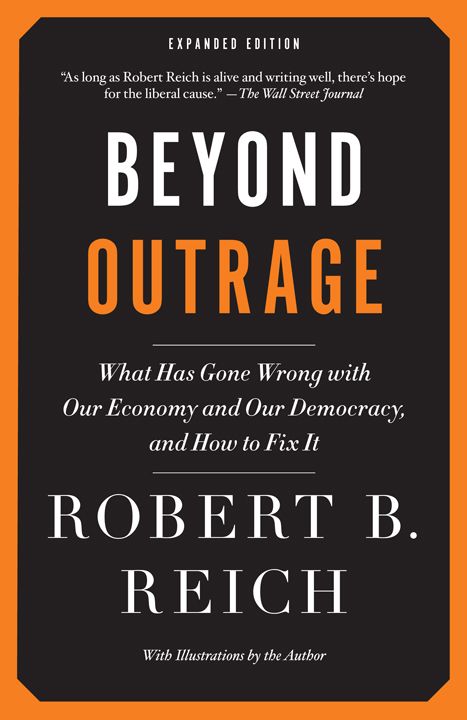
Beyond Outrage
Expanded Edition: What has gone wrong with our economy and our democracy, and how to fix it
کتاب های مرتبط
- اطلاعات
- نقد و بررسی
- دیدگاه کاربران
نقد و بررسی

October 29, 2012
Persuasively arguing that Americans haven't learned the economic lessons of the Great Depression and the stock crash of 2008, and stating that "the U.S. economy won't really bounce back until America's surge to inequality is reversed," former labor secretary Reich (Aftershock) examines how we got into this mess and offers solutions in this slim but informative study. In his view, "An economy should exist for the people who inhabit it, not the other way around," Reich writes, assailing the ramifications of Wall Street's unchecked power and the detrimental impact of the "Regressive Right," his term for conservative Republicans whose social Darwinist agenda, helped along by passivity on the part of Democrats, poses a very real threat to the nation. Reich charges Supreme Court Justices Scalia and Thomas, and Newt Gingrich with shady political dealings, while he systematically debunks various right-wing tactics, such as the benefits of lowering taxes on corporations in order to stimulate job growth. As for solutions, Reich's advice ranges from the simple (become an active citizen) to the specific, such as restoring taxes on the rich to pre-1981 levels, expanding Medicare to cover all Americans and tightening restrictions on big banks. Regardless of where readers stand on many of the polarizing concepts he addresses, Reich offers food for thought.

September 1, 2012
Reich (Public Policy/Univ. of California, Berkeley; Aftershock: The Next Economy and America's Future, 2011, etc.) spells out what he thinks citizens need to do to ensure Washington acts on behalf of the public good, not special interests. Bill Clinton's former labor secretary reports that, due to the emails he receives, he is well aware of the electorate's mood. He believes citizens must band together "without scapegoating or cynicism" on the basis of "moral clarity and undeniable facts" if they want to succeed. Reich writes that the basic bargain--"that employers paid their workers enough to buy what employers were selling"--underlying America's post-World War II prosperity has been violated, with the result of increasing inequality and poverty. This reversal reflects a deliberate choice, which Reich attributes to "regressives," embodied by such officials as Eric Cantor, Paul Ryan, Newt Gingrich and Rick Santorum. They want to "return America to the 1920s--before Social Security, unemployment insurance, labor laws, the minimum wage," etc. Still others, writes the author, want to go back even further, promoting a political revival of 19th-century social Darwinism to justify shameless inequality and survival of the fittest. For Reich, the Republican Party, which disavowed social Darwinism in the 1950s, is marching backward, but the author writes that the Democrats' "stunning failure" to offer an alternative has helped regressives gain political traction. The author outlines a series of organizing initiatives intended to broaden citizen involvement at all levels of government and provides a handy list of the "Ten Biggest Lies" the regressives are using to fuel their campaign. Short and lively, this is a timely contribution to making the ongoing discussion more productive.
COPYRIGHT(2012) Kirkus Reviews, ALL RIGHTS RESERVED.

September 15, 2012
The problem with our economy is that it currently works for the fewcorporate and Wall Street elitesat the expense of the rest of us, former labor secretary Reich argues. Elites not only receive higher compensation but enjoy greater job security. Regressives politicians who have been co-opted by big moneyhave turned the question of American morality upside down. These regressive forces push a divide-and-conquer strategy, primarily by raising alarms over deficit spending and asserting a need to cut public programs that benefit the middle class and the poor. Reich notes the blame heaped on public employees for state budget crises in comparison to that accorded either Wall Street practices that led to the recession or the Supreme Court's Citizens United decision that removed limitations on corporate contributions to political campaigns. Reich recommends that politicians and the public get out of their ideological bubbles and face the need to raise tax rates on the wealthy, reduce military spending, and restrict the size of banks to reduce the risk to taxpayers in case of failure.(Reprinted with permission of Booklist, copyright 2012, American Library Association.)

























دیدگاه کاربران